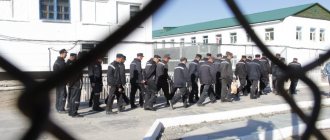1. Escape from a place of deprivation of liberty, from arrest or from custody, committed by a person serving a sentence or in pre-trial detention, -
shall be punishable by forced labor for a term of up to four years or imprisonment for the same term.
2. The same act, committed by a group of persons by prior conspiracy or by an organized group, -
shall be punishable by forced labor for a term of up to five years or imprisonment for the same term.
3. Acts provided for in parts one or two of this article, committed with the use of violence dangerous to life or health, or with the threat of such violence, as well as with the use of weapons or objects used as weapons, -
shall be punishable by forced labor for a term of up to five years or imprisonment for a term of up to eight years.
- Article 312. Illegal actions in relation to property subject to inventory or seizure or subject to confiscation
- Article 314. Evasion from serving restriction of freedom, imprisonment, as well as from the application of compulsory measures of a medical nature
Commentary to Art. 313 of the Criminal Code of the Russian Federation
The main object of the crime is the interests of justice in the field of execution of court decisions. An additional object is the normal activity of places of confinement, arrest, and detention. If the escape was accompanied by the signs specified in Part 3 of Art. 313 of the Criminal Code of the Russian Federation, then human health also acts as an additional object.
The social danger of escape lies in the fact that the serving of a sentence by a person sentenced to imprisonment is interrupted, which counteracts the execution of a court sentence, the execution of a court decision on choosing a preventive measure in the form of detention in relation to a suspect or accused is interrupted, and a preliminary investigation is made difficult or impossible. and judicial consideration of the case, if the person is in custody as a preventive measure, i.e. harm to the interests of justice. In addition, the activities of a correctional institution or law enforcement agency are disorganized to a certain extent due to the diversion of forces and resources to search and detain a fugitive, creating the danger that this person will commit a new crime, and creating doubt among the population about the ability of specially created bodies to ensure reliable isolation of criminals from society.
The objective side of the crime provided for in Part 1 of Art. 313 of the Criminal Code of the Russian Federation, consists of escaping from a place of imprisonment, from arrest or from custody.
Places of deprivation of liberty are institutions in which those sentenced to imprisonment serve their sentences. In accordance with Part 1 of Art. 73 of the Penal Code of the Russian Federation, those sentenced to imprisonment serve their sentences in correctional institutions.
According to Part 1 of Art. 74 of the Penal Code of the Russian Federation, correctional institutions are correctional colonies, educational colonies, prisons, and medical correctional institutions. Pre-trial detention centers perform the functions of correctional institutions in relation to convicts left to perform household maintenance work, as well as in relation to convicts sentenced for a period of not more than six months, left in pre-trial detention centers with their consent.
Correctional colonies are divided into settlement colonies, general-regime correctional colonies, high-security correctional colonies, and special-regime correctional colonies (Part 2 of Article 74 of the Penal Code of the Russian Federation).
In accordance with Part 1 of Art. 77 of the Penal Code of the Russian Federation, in exceptional cases, persons sentenced for the first time to imprisonment for a term of not more than five years, who are assigned to serve their sentence in a general regime correctional colony, may, with their consent, be left in a pre-trial detention center or prison to perform household maintenance work.
Currently, arrest as a form of punishment has not been introduced.
The legislator in Art. 313 of the Criminal Code of the Russian Federation establishes criminal liability for violation of the requirements of a court conviction.
When escaping from custody, the matter must be a violation of the requirements of a judicial act on the selection of a preventive measure.
Places of detention of suspects and accused in accordance with Art. 7 of the Federal Law of July 15, 1995 N 103-FZ “On the detention of suspects and accused of committing crimes” are:
———————————
NW RF. 1995. N 29. Art. 2759.
— pre-trial detention centers of the penal system;
— temporary detention centers for suspects and accused of internal affairs bodies;
— temporary detention centers for suspects and accused border agencies of the Federal Security Service.
In cases provided for by this Federal Law, places of detention of suspects and accused may be institutions of the penal system that carry out criminal punishment in the form of imprisonment, and guardhouses.
In cases where detention on suspicion of committing a crime is carried out in accordance with the Code of Criminal Procedure of the Russian Federation by captains of sea vessels on long voyages, or by the heads of wintering quarters during the absence of transport connections with wintering quarters, the suspects are kept in premises that are determined by the specified officials and are adapted for these purposes. goals.
In accordance with Part 1 of Art. 10 of the Federal Law of July 15, 1995 N 103-FZ, convicts serving sentences in correctional institutions, detained on suspicion of committing another crime, may be kept in custody in these institutions, but in isolation from convicts serving their sentences.
Suspects and accused persons, in respect of whom detention in custody has been chosen as a preventive measure, may be kept in prisons or on the territories of institutions executing punishments, in premises specially equipped for these purposes, functioning as pre-trial detention centers (Part 2 of Article 10 of the Federal Law dated July 15, 1995 N 103-FZ). The list of correctional institutions in the territories of which suspects and accused may be held is approved by the Minister of Justice of the Russian Federation in agreement with the Prosecutor General of the Russian Federation.
———————————
Order of the Ministry of Justice of Russia dated June 30, 1999 N 212 “On approval of the List of correctional institutions in the territories of which premises operating as pre-trial detention centers have been created” (as amended) // Bulletin of the Ministry of Justice of the Russian Federation. 1999. N 7.
Suspects and defendants in respect of whom detention in custody has been chosen as a preventive measure, in the case of an examination ordered on the grounds provided for by the Code of Criminal Procedure of the Russian Federation, as well as in the case of providing them with medical assistance, are placed in medical institutions (Part 3 of Article 10 of the Federal Law of 15 July 1995 N 103-FZ).
———————————
Order of the Ministry of Internal Affairs of Russia and the Ministry of Health of Russia dated December 31, 1999 N 1115/475 “On approval of the Instruction on the procedure for medical and sanitary provision of persons held in temporary detention centers of internal affairs bodies” // BNA of the Russian Federation. 2000. N 11.
Suspected and accused military personnel are kept in guardhouses (Article 11 of the Federal Law of July 15, 1995 N 103-FZ).
The place of detention of suspects or accused in respect of whom detention has been chosen as a preventive measure is also the premises in the preliminary investigation bodies (office of the investigator, the person conducting the inquiry), the courtroom, vehicles used for transportation to the place of departure punishment, to court, etc., as well as any other institutions where a person is under escort when carrying out investigative actions. The place of detention is also considered to be the place where investigative actions are carried out, for example, when examining a crime scene or conducting an investigative experiment.
The moment of detention occurs simultaneously with the announcement to the person of the application of this preventive measure to him.
Escape is understood as unauthorized illegal (contrary to the law, without the permission of competent officials) leaving a place of imprisonment or a place of detention or custody by a person serving a sentence or being in custody or under arrest.
Escape can only be accomplished as a result of active actions. This could be digging, breaking a wall, sawing bars, escaping from guards, etc. There are cases of receiving forged documents in places of deprivation of liberty, releasing convicts from serving their sentences. Such “release” of a convicted person is also an escape. There are cases of escapes accomplished by bribing the administration of places of detention or pre-trial detention centers.
Escape can only be made from the places indicated in the disposition of the commented article. The crime scene in this composition is a mandatory sign of the objective party.
An escape from a dormitory outside a correctional institution, from a work site, or along the route to it of a person who was allowed to travel without an escort or escort is considered committed from a place of deprivation of liberty. At the same time, evasion from the prescribed route of a person sentenced to imprisonment, who is allowed to travel without an escort, is not an escape if this is done without the purpose of evading serving a sentence. Such actions are recognized as a violation of the regime of the correctional institution and entail disciplinary liability.
Escape from a place of deprivation of liberty will also be illegal unauthorized leaving of the place of a long meeting outside the correctional institution. Failure to return from a vacation spent outside a correctional institution does not constitute the crime in question, since there are no signs of escape such as unauthorized, illegal leaving of the place of deprivation of liberty. In this case, leaving the correctional institution is carried out legally. If permission to travel outside the place of confinement during vacation was obtained fraudulently, failure to return should be considered an escape.
By design, escape refers to crimes with a formal composition and is considered completed from the moment of: 1) crossing the outer perimeter of a place of deprivation of liberty (for example, a general regime correctional colony) or a place of detention (for example, a pre-trial detention center or a temporary detention center), if the escape is complete from the territory of such places; 2) complete loss of control over the escort by the convoy, if the escape was made during the convoy process outside the specified places, in other words, when the subject will be able, at his own discretion, to change locations, come into contact with other persons, etc.
Judicial practice also proceeds from the fact that from the moment the security is overcome, the crime is considered completed.
———————————
See: Bulletin of the Supreme Court of the RSFSR. 1965. N 10. P. 11 (R.’s case).
Taking into account the specific conditions of serving a sentence in penal colonies, the moment of completion of escape from them is determined differently. In accordance with Art. 129 of the Penal Code of the Russian Federation in colony settlements, those sentenced to imprisonment during the hours from waking up to lights out have the right to free movement within the colony settlement. In these cases, the moment of the end of the escape will be the moment of unauthorized abandonment of the territory of the colony-settlement. In addition, with the permission of the administration of the colony-settlement, convicts can move without supervision outside the colony-settlement, but within the territory of the corresponding administrative-territorial entity. An escape committed under such conditions will be completed from the moment of illegally leaving the territory of the administrative-territorial entity.
Escape from places of imprisonment, pre-trial detention and from custody is a continuing crime. It ends with the arrest of the perpetrator or his confession. Recognition of escape as a continuing crime affects the calculation of the statute of limitations (Article 83 of the Criminal Code of the Russian Federation), as well as the application of an amnesty (Article 84 of the Criminal Code of the Russian Federation). The statute of limitations at the time of escape is interrupted and resumed only after the arrest of the fugitive or his surrender. An amnesty can be applied to such persons (if it applies to a given person) only if the person was detained or turned himself in before the issuance of the amnesty decree (unless otherwise specified in the text of the amnesty itself).
———————————
In Art. 13 Resolution of the Supreme Court of the Russian Federation dated June 18, 1992 N 3075-1 (as amended on November 13, 1992) “On amnesty” (Gazette of the Supreme Court of the Russian Federation. 1992. N 47. Art. 2671) indicated that persons Those who escaped from places of imprisonment or from custody, who appeared within a month from the date of publication of the amnesty act to the police or the place where they served their sentence, are exempt from liability for escape or evasion from serving their sentence.
In the literature, two moments of the end of an escape are distinguished: legal - from the moment of leaving the place of deprivation of liberty and actual - from the moment of surrender, detention, death of the perpetrator, changes in the criminal law that decriminalizes the act or reduces the punishment to the one actually served, from the moment of issuing an act of amnesty or pardon. The calculation of the statute of limitations for criminal prosecution for escape begins from the moment the crime actually ends.
———————————
See: Criminal law. Special part: Textbook. for universities / Rep. ed. AND I. Kozachenko, Z.A. Neznamova, G.P. Novoselov. M., 2000. S. 653 - 654.
Thus, we can conclude that the corpus delicti of the crime in question is completed from the moment of leaving the place of deprivation of liberty or the complete loss of control over the escort by the convoy.
A crime, as a socially dangerous act, will be completed as a result of the action of the culprit himself, aimed at stopping the crime, or the occurrence of events that prevent the commission of the crime (for example, the intervention of authorities).
The subjective side of the crime is characterized by direct intent. The person is aware that a preventive measure has been chosen for him in the form of detention, or he has been detained on suspicion of committing a crime, or has been sentenced to imprisonment or arrest. His consciousness also embraces the fact that he is leaving this place without permission, and desires it.
Considering issues of judicial practice in cases of escapes, the Plenum of the Supreme Court of the Russian Federation in Resolution No. 1 of March 19, 1975 “On judicial practice of considering materials on the transfer of convicts to forced labor colonies-settlements and criminal cases on escapes from these colonies” indicated the following : “When considering cases of escapes from penal colonies, courts must take into account the peculiarities of the detention regime in such colonies (lack of barriers, security, etc.), and therefore, in each case, especially carefully examine the actual circumstances of the convict’s unauthorized abandonment of this colony, motives, reasons and conditions that prompted him to commit such an act, and, based on the totality of all the collected evidence, as well as personal data, decide whether his actions contained a crime under Art. 313 of the Criminal Code of the Russian Federation or Art. 314 of the Criminal Code of the Russian Federation. Do not allow facts of conviction for actions that only formally contain signs of escape or evasion from serving the sentence of a convicted person who is allowed a short-term exit from places of deprivation of liberty, but in essence constitute violations of the established procedure for serving a sentence, liability for which is provided for in Art. 115 of the Penal Code of the Russian Federation."
The special subject of the crime in question is a person who has reached the age of sixteen: a) sentenced to punishment in the form of imprisonment or arrest; b) in respect of whom a preventive measure has been chosen - detention (Article 108 of the Code of Criminal Procedure of the Russian Federation); c) detained as a person suspected of committing a crime (Article 91 of the Code of Criminal Procedure of the Russian Federation).
Minors aged fourteen to sixteen years for escaping from an educational colony or from custody are liable under Art. 313 of the Criminal Code of the Russian Federation is not covered.
Persons subjected to administrative arrest as a measure of administrative punishment (Article 3.9 of the Code of Administrative Offenses of the Russian Federation), those subjected to administrative detention on the basis of Art. 27.3 Code of Administrative Offenses of the Russian Federation. In the literature, there is a point of view that persons who were illegally convicted or those for whom a preventive measure was chosen illegally do not belong to the subjects.
———————————
See, in particular: Criminal law. Special part: Textbook. for universities / Rep. ed. AND I. Kozachenko, Z.A. Neznamova, G.P. Novoselov. M., 2000. S. 653 - 654; Criminal law. Special part: Textbook. / Under the general ed. IN AND. Radchenko. M., 2004. P. 570.
Since the law does not indicate the legality of detention and in places of deprivation of liberty, escape cannot be an act of necessary defense (Article 37 of the Criminal Code of the Russian Federation) from illegal actions of the justice authorities, since there is an appropriate legal toolkit for resolving this legal conflict - the procedure appealing a judicial act. The issue of ensuring the right to personal safety cannot be resolved by escaping. If a threat to personal safety arises, convicts have the right to contact any official of the place of deprivation of liberty or arrest house with a request to ensure personal safety, which obliges these officials to immediately take the necessary measures to protect convicts from the impending danger (Article 13 of the Penal Code of the Russian Federation). Consequently, escape as a circumstance of extreme necessity (Article 39 of the Criminal Code of the Russian Federation) is unacceptable.
———————————
At the same time, it should be noted that in practice there are court decisions that speak of the factor of the legality of detention in places of deprivation of liberty as a mandatory condition for escaping. See: Review of the judicial practice of the Supreme Court of the Russian Federation on the consideration of criminal cases in cassation and supervisory procedures in 1995 // Bulletin of the Supreme Court of the Russian Federation. 1996. N 8.
Responsibility for escaping from places of imprisonment, from arrest or from custody under the laws of foreign countries
Vilkova Alevtina Vladimirovna
Doctor of Pedagogical Sciences, Associate Professor, Leading Researcher
Research Institute of the Federal Penitentiary Service of Russia;
Russia (125130, Moscow, Narvskaya st., 15A)
Abstract: the article covers issues of liability for escaping from places of imprisonment, from arrest or from custody under the laws of foreign countries
Key words: criminal code, types of punishments, escape, arrest
Responsibility for escaping from places of deprivation of liberty, arrest or detention under the laws of foreign States
Vilkova Alevtina Vladimirovna
doctor of pedagogical Sciences, associate Professor, leading researcher
Research Institute of the Federal penitentiary service of Russia;
Russia (125130, Moscow, Narvskaya str., 15A)
Abstract: the article highlights the issues of responsibility for escaping from places of detention, from arrest or from detention under the legislation of foreign States
Keywords: criminal code, types of punishment, escape, arrest
In the legislation of most foreign countries there is no general definition of punishment, but only establishes a system of penalties that can be imposed for committing a criminal act. At the same time, in Anglo-American criminal law, certain types of punishment can be found not only in criminal laws, but in other normative legal acts. Penalties under English criminal law include life imprisonment; imprisonment from one day to 25 years; a fine, the amount of which, subject to a number of restrictions, depends only on judicial practice; deprivation of active and passive suffrage; deprivation of a driver's license for up to three years; surety; probation; full or conditional release; providing free services to the public; compulsory treatment; guardianship; detention as long as it pleases Her Majesty; placement in a detention center; supervision; guardianship; referral to the visitation center [1].
Despite the fairly large number of punishments applied to convicted persons in England, liability occurs only for evasion of paying a fine. A fine in England is a fairly common punishment; it is imposed, on average, for every third crime. Failure to pay a fine results in its replacement with imprisonment. The maximum duration of imprisonment in lieu of an unpaid fine cannot be more than 12 months [2]. It should be noted that in England there is no criminal liability for escaping from prison.
The punishment system in France is built in accordance with the classification of criminal acts into three groups. Crimes are punishable by criminal penalties, misdemeanors by correctional penalties, violations by police.
French Criminal Code of 1992 in art. 131-1 provides for the following types of criminal penalties for individuals: lifelong criminal imprisonment or imprisonment; imprisonment or imprisonment from 10 to 30 years. For committing a crime, in addition to criminal imprisonment or imprisonment, individuals may be subject to a fine, the maximum amount of which is 50 million francs.
Article 131-3 of the Criminal Code contains a list of corrective punishments. These include: imprisonment (the maximum amount of correctional imprisonment is established by the code at 10 years, the minimum is not established), a fine (up to 1 million francs), a fine in the form of fine days (spread over the days of payment of the fine), unpaid work in public interests (from 40 to 240 hours), deprivation or limitation of certain rights provided for in Article 131-6.
Police penalties include a fine (the maximum fine is 10 thousand francs, the minimum fine is not established), as well as penalties consisting of deprivation of certain rights or their restriction.
The French Criminal Code provides for liability for evasion of a number of penalties. Article 434-30 of the Criminal Code establishes the penalty for escaping from prison as three years' imprisonment and a fine of 300,000 francs. If the escape is carried out with the threat of a weapon, explosive, flammable or toxic substance, or in an organized group, it is punishable by seven years' imprisonment and a fine of 700,000 francs. If the threats listed above are applied, a penalty of up to 10 years' imprisonment and a fine of up to 1,000,000 francs may be imposed.
The punishment system in the Criminal Code of Germany includes basic and additional punishments. The Criminal Code of the Federal Republic of Germany contains in the General Part the third section, which includes criminal law regulations on the legal consequences of the act. Chapter one of the section under consideration provides for two types of punishments, which by their legal nature are basic - imprisonment for life or for a certain period (from 1 month to 15 years) (§ 38, 39 of the Criminal Code of the Federal Republic of Germany) and a fine, which is assigned in daily rates from 5 to 360 full daily rates, which on average range from 2 to 10,000 marks [3] (§ 40 - 43 of the Criminal Code of the Federal Republic of Germany).
Additional penalties include one - prohibition to drive a vehicle; in some cases, confiscation of the objects of the crime may also be imposed if it is not of a security nature (§ 44 of the Criminal Code of the Federal Republic of Germany). In addition, a novelty of the German Criminal Code is a punishment specific to German criminal law, such as a property fine (§ 43a of the German Criminal Code), which has a special legal nature, since it cannot be classified as either a basic or additional punishment. In the Criminal Code of the Federal Republic of Germany, Paragraph 121 of the Criminal Code of the Federal Republic of Germany provides for the liability of convicted persons in the event that they get together and, armed, organize an escape using violence. This act is punishable by imprisonment for a term of 3 to 5 years.
Spanish Criminal Code in art. 32 provides for three types of punishments: imprisonment, deprivation of certain rights and a fine[4]. Article 35 of the Criminal Code defines deprivation of liberty as imprisonment, weekend arrest and personal liability for failure to pay a fine. The latter is a punishment for evading payment of a fine.
Prison terms are provided for from six months to 20 years, and for the totality of sentences and crimes - up to 30 years.
According to Art. 37 of the Criminal Code, arrest is applied on weekends from 36 hours (which are equivalent to 2 days) to 24 days. Based on Article 88 of the Criminal Code, imprisonment for up to one year can be replaced by arrest on weekends or a fine. A week of imprisonment is equivalent to 2 days of arrest, 1 day of imprisonment is equivalent to two days’ wages. If these punishments do not achieve the educational goals set or the person to whom they are applied violates them, then the old punishment is assigned minus the replaced part served. In the event that the offender twice unlawfully misses serving his sentence in the form of arrest on weekends, it is executed continuously.
The Spanish Criminal Code establishes liability for the escape of a convicted person from a place of imprisonment. If a person sentenced to a term of up to one year escapes, he is subject to a fine of up to 6 months' salary. In other cases, the fine ranges from 12 to 24 months' salary. In Art. 469 of the Criminal Code stipulates that for escape with the use of violence a fine ranging from 6 months to 4 years’ salary is imposed.
According to the Swiss Criminal Code, criminal penalties include imprisonment, arrest, fine, dismissal from office, deprivation of parental or guardianship authority, prohibition to engage in a certain profession or trade or enter into trade transactions, deportation outside the country, prohibition from visiting a specific restaurant [5].
The maximum fine, according to Art. 48 of the Swiss Criminal Code is 40,000 francs. The period for its payment is determined by the convicted person from one to three months. If the convicted person does not pay the fine within the time limit established for him and does not otherwise work it off, then the competent authority orders the collection of the debt from him. In Part 3 of Art. 49 establishes that if the convicted person does not pay the fine at all and does not otherwise work it off, then the judge replaces the fine with arrest. In this case, a thirty-franc fine is equivalent to one day of arrest, and the substituted punishment cannot exceed three months.
If the convicted person evades punishment in the form of expulsion from the state or canton, then in accordance with Art. 291 of the Swiss Criminal Code is punishable by imprisonment.
Art. 310 of the Swiss Criminal Code provides for liability for the release of prisoners. In particular, this article determines that if anyone, using violence, threat or cunning, releases an arrested person, a prisoner or another person who, on the basis of an administrative order, has been sent to the appropriate institution, or assists him in escaping, he is punished by imprisonment. If a criminal act was committed by a group of people, then everyone who participates in it is punishable by imprisonment. A participant who uses violence against persons or things shall be punished by imprisonment for not less than three years or imprisonment for not less than one month.
The Criminal Code of the People's Republic of China of 1979, for the first time in the history of the criminal legislation of the PRC, established an exhaustive list of punishments applied by the courts against criminals. The criminal punishment system includes five main types - supervision, criminal arrest, fixed-term imprisonment, indefinite imprisonment, death penalty - and three additional ones - fine, deprivation of political rights and confiscation of property. For foreigners, expulsion from the country may be applied as an independent or additional measure (Article 30). In addition to the criminal penalties presented in the punishment system, the Chinese legislator has introduced other measures into the Criminal Code that are not criminal penalties. In the theory of criminal law of the PRC, they are all combined into one group of “sanctions that are not criminal penalties”[6].
The Criminal Code of the People's Republic of China is not the only source of the country's criminal law. In accordance with the decision of the Standing Committee of the NPC, almost all normative acts of a criminal legal nature that were in force before the entry into force of the 1979 Criminal Code retained legal force. In this regard, the Chinese legislator does not exclude the possibility, in certain cases, when qualifying crimes, to resort to rules of law that lie outside the framework of the code. Thus, at present, the Resolution on the punishment of persons who escaped from correctional labor institutions or who committed a crime again dated June 11, 1981 is in force. It mainly regulates problems arising in connection with the use of this type of criminal punishment such as imprisonment, and also addresses issues of liability for escaping from a place of imprisonment. The second part of the above Resolution repeats the provision of paragraph 2 of Article 161 of the Criminal Code of the People's Republic of China on escape from places of imprisonment and establishes that for escape from a correctional labor institution, in addition to the original punishment, imprisonment for a term of up to 5 years is imposed. If the escape was accompanied by violence and threats, additional punishment may be set in the range of 2 to 7 years in prison.
To summarize, it can be noted that in the criminal laws of developed foreign countries the main punishments are imprisonment, a fine and loss of rights. This suggests that the total number of types of criminal penalties in these countries is less than in Russia. This number of punishments is quite enough to regulate the relationship between the criminal and the state.
Of course, the rules establishing responsibility for evading punishment by convicted persons are contained in the criminal legislation of foreign countries. However, in general, the legislator approaches this issue differently. Accordingly, two main approaches can be distinguished.
The first is that evasion of various types of punishment is punishable by a fine, and only in particularly serious cases, when evasion is accompanied by the commission of a new crime (escaping with violence), is it punishable by imprisonment. This approach is typical for countries where natural rights and freedoms are recognized as inalienable and where evasion is simply a desire to free oneself from coercion. By committing such acts, a person violates only the court decision and the normal operating procedure of the penal system, and therefore a fine will be the only correct punishment for this. An example of such states is Spain.
The second approach is characterized by the fact that any evasion of punishment is punishable by both a fine and imprisonment. This is typical for those countries where this act is considered a challenge to the state and society, for example, the USA, France, Germany.
Literature:
- Imanov E.Z. Criminal law of the People's Republic of China. M., 1990. P. 199.
- Krylova N.E., Serebryannikova A.V. Decree. op. pp. 150-151.
- Crime and punishment in England, USA, France, Germany. Japan: general part of criminal law. M.: 1991, p. 41.
- Serebryannikova A.V. Swiss Criminal Code. M., 2002. S. 22 – 27.
- Criminal Code of the Federal Republic of Germany. M., 1996. P. 58.
- Spanish Penal Code of 1995. M., 1998. P. 76.
Literature:
1. Imanov, EZ Criminal law of the people's Republic of China. M., 1990. P.199.
2. Krylov NE Serebryannikov AV Decree. CIT. P. 150-151.
3. Crime and punishment in England, USA, France, Germany. Japan: General part of criminal law. M.: 1991, P. 41.
4. Serebryannikov AV UK Switzerland. M., 2002. P. 22 – 27.
5. The criminal code of Germany. M., 1996. P. 58.
6. Spanish penal code, 1995. M., 1998. P. 76.
[1] See: Crime and punishment in England, USA, France, Germany. Japan: general part of criminal law. M.: 1991, p. 41.
[2] See: Krylova N.E., Serebryannikova A.V. Decree. op. pp. 150-151.
[3] See: Criminal Code of the Federal Republic of Germany. M., 1996. P. 58.
[4] See: Spanish Penal Code 1995. M., 1998. P. 76.
[5] See: Serebryannikova A.V. Swiss Criminal Code. M., 2002. S. 22 – 27.
[6] See: Imanov E.Z. Criminal law of the People's Republic of China. M., 1990. P. 199.
Judicial practice under Article 313 of the Criminal Code of the Russian Federation
Appeal ruling of the Judicial Collegium for Criminal Cases of the Supreme Court of the Russian Federation dated June 19, 2018 N 31-APU18-7
- November 29, 1999 under Part 3 of Art. , part 1 art. 313, Art. of the Criminal Code of the Russian Federation to 19 years 3 months of imprisonment (taking into account changes made by resolutions of 03/04/2005 and 06/04/2010) - to 17 years of imprisonment, released after serving the sentence on 07/28/2016, -
Resolution of the Presidium of the Supreme Court of the Russian Federation dated July 4, 2018 N 97P18
Convicted: under Part 1 of Art. 222 of the Criminal Code of the Russian Federation to 1 year 6 months of imprisonment, under clause “b”, part 4 of art. 162 of the Criminal Code of the Russian Federation to 8 years in prison, under clauses “a”, “b”, “c”, part 4 of Art. 162 of the Criminal Code of the Russian Federation to 12 years in prison, under clauses “g”, “z”, part 2 of Art. 105 of the Criminal Code of the Russian Federation to 17 years in prison, under Part 3 of Art. , part 1 art. 313 of the Criminal Code of the Russian Federation to 1 year 1 month of imprisonment, on the basis of Part 3 of Art. of the Criminal Code of the Russian Federation for the totality of crimes, by partial addition of punishments to 21 years of imprisonment, on the basis of Art. of the Criminal Code of the Russian Federation based on the totality of sentences, by partially adding the unserved sentence under the sentence of April 29, 1996, finally to 22 years of imprisonment in a special regime correctional colony.
Cassation ruling of the Judicial Collegium for Criminal Cases of the Supreme Court of the Russian Federation dated August 23, 2018 N 46-O18-1
- according to Part 3 of Art. , part 1 art. 313 of the Criminal Code of the Russian Federation for 1 year 1 month. Based on Part 3 of Art. The Criminal Code of the Russian Federation for the totality of crimes by partial addition of punishments imposed 21 years of imprisonment.
Appeal ruling of the Judicial Collegium for Criminal Cases of the Supreme Court of the Russian Federation dated October 4, 2018 N 32-APU18-12
Convicted under paragraph “d” of Part 2 of Art. 105 of the Criminal Code of the Russian Federation to 18 years in prison, with restriction of freedom for a period of 1 year; according to Part 1 of Art. 313 of the Criminal Code of the Russian Federation to 2 years in prison. In accordance with Part 3 of Art. The Criminal Code of the Russian Federation, for the totality of crimes, by completely adding up the punishments, assigned Dubovitsky S.P. punishment in the form of imprisonment for a term of 20 years with restriction of freedom for a period of 1 year, imposed on Dubovitsky S.P. restrictions: do not travel outside the territory of the municipality where the convicted person will live after serving imprisonment, do not change the place of residence or stay without the consent of the relevant penal inspection, supervising the serving of the convicted person’s sentence in the form of restriction of freedom, and once a month appear at the specified authority for registration.
Appeal ruling of the Judicial Collegium for Military Personnel Cases of the Supreme Court of the Russian Federation dated March 12, 2019 N 203-APU19-4
sentenced to imprisonment: under clauses “g”, “e”, part 2 of Art. 206 of the Criminal Code of the Russian Federation for a period of 12 years with restriction of freedom for a period of 1 year, under Part 3 of Art. and part 3 of Art. 313 of the Criminal Code of the Russian Federation for a period of 4 years, and for the totality of crimes in accordance with Part 3 of Art. of the Criminal Code of the Russian Federation by partial addition of punishments - to 14 years of imprisonment with restriction of freedom for a period of 1 year with the establishment of restrictions specified in the verdict and the imposition of responsibilities.
Cassation ruling of the Judicial Collegium for Criminal Cases of the Supreme Court of the Russian Federation dated November 27, 2019 N 5-UD19-160
convicted under Part 3 of Art. , part 1 art. 228.1 of the Criminal Code of the Russian Federation to 6 years in prison; according to Part 1 of Art. 313 of the Criminal Code of the Russian Federation to 3 years in prison. Based on Part 2 of Art. of the Criminal Code of the Russian Federation for the totality of crimes by partial addition of punishments to Ivanov S.V. sentenced to 8 years in prison. In accordance with Art. The Criminal Code of the Russian Federation, based on the totality of sentences, partially added to the imposed punishment the unserved sentence under the sentence of October 28, 2010 and finally to S.V. Ivanov. sentenced to 8 years and 6 months of imprisonment in a high security correctional colony.
Determination of the Constitutional Court of the Russian Federation dated December 19, 2017 N 2867-O
THE RIGHTS OF ARTICLE 313 OF THE CRIMINAL CODE OF THE RUSSIAN FEDERATION The Constitutional Court of the Russian Federation, composed of Chairman V.D. Zorkin, judges K.V. Aranovsky, A.I. Boytsova, N.S. Bondar, G.A. Gadzhieva, Yu.M. Danilova, L.M. Zharkova, S.M. Kazantseva, S.D. Knyazeva, A.N. Kokotova, L.O. Krasavchikova, S.P. Mavrina, N.V. Melnikova, Yu.D. Rudkina, O.S. Khokhryakova, V.G. Yaroslavtseva,
Appeal ruling of the Judicial Collegium for Criminal Cases of the Supreme Court of the Russian Federation dated December 19, 2019 N 4-APU19-43
- according to Part 3 of Art. 313 of the Criminal Code of the Russian Federation to imprisonment for a term of 7 years; - according to paragraph “b” of Part 4 of Art. 226 of the Criminal Code of the Russian Federation to imprisonment for a term of 12 years; - according to Art. 317 of the Criminal Code of the Russian Federation to imprisonment for a term of 18 years.
Determination of the Constitutional Court of the Russian Federation dated February 27, 2020 N 301-O
1. By the verdict of the regional court of December 9, 2009, citizen M.M. Hook was found guilty of two crimes and was sentenced to 15 years in prison. As follows from the materials he presented, after the verdict was announced, he escaped from custody on the same day, i.e. a new crime provided for in part one of Article 313 of the Criminal Code of the Russian Federation, for which he was convicted by a district court verdict of March 3, 2010, with a final punishment imposed according to the rules of cumulative sentences in the form of imprisonment for a term of 17 years.
Appeal ruling of the Judicial Collegium for Criminal Cases of the Supreme Court of the Russian Federation dated May 18, 2017 N 66-APU17-3SP
September 14, 2000 under Part 1 of Art. 313, part 3 art. 158, paragraphs “b”, “c”, part 2 of Art. 161, part 3 art. , of the Criminal Code of the Russian Federation to 8 years 3 months of imprisonment, followed by parole on October 10, 2006 for an unserved term of 10 months;
Appeal ruling of the Judicial Collegium for Criminal Cases of the Supreme Court of the Russian Federation dated 06/07/2017 N 46-APU17-6
convicted under Part 3 of Art. , part 1 art. 313 of the Criminal Code of the Russian Federation to 1 year 6 months of imprisonment, under paragraph “c” of Part 4 of Art. 162 of the Criminal Code of the Russian Federation to 9 years in prison, under clauses “g”, “z”, part 2 of Art. 105 of the Criminal Code of the Russian Federation to 15 years in prison. Based on Part 3 of Art. The Criminal Code of the Russian Federation finally appointed 17 years of imprisonment in a maximum security correctional colony.






